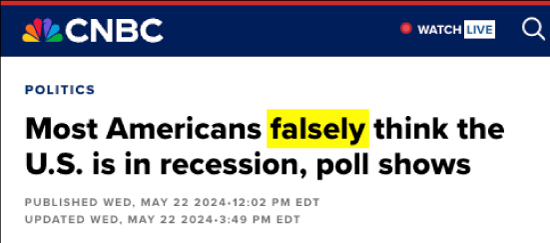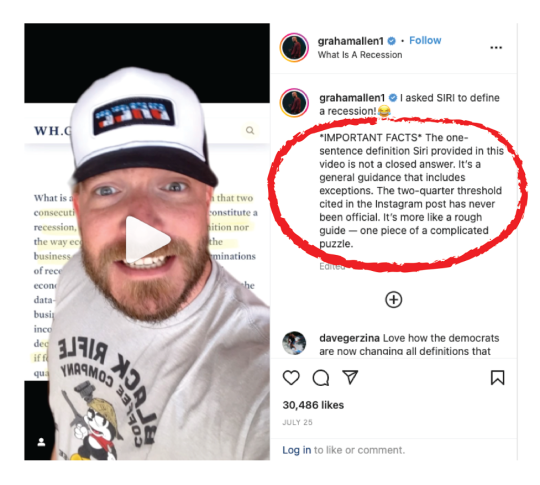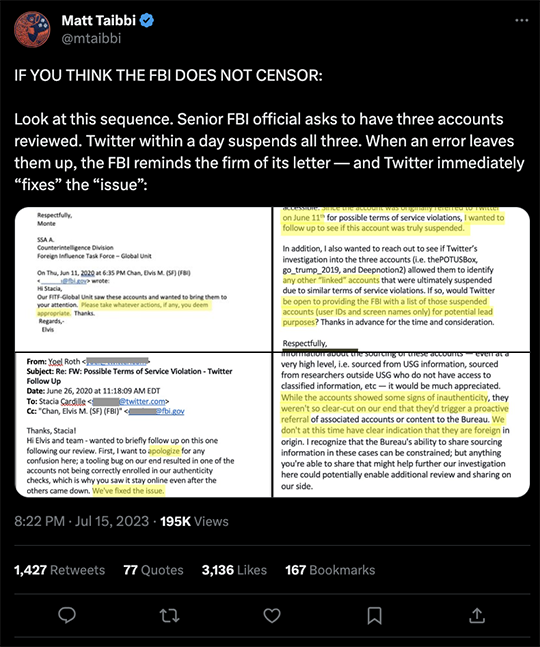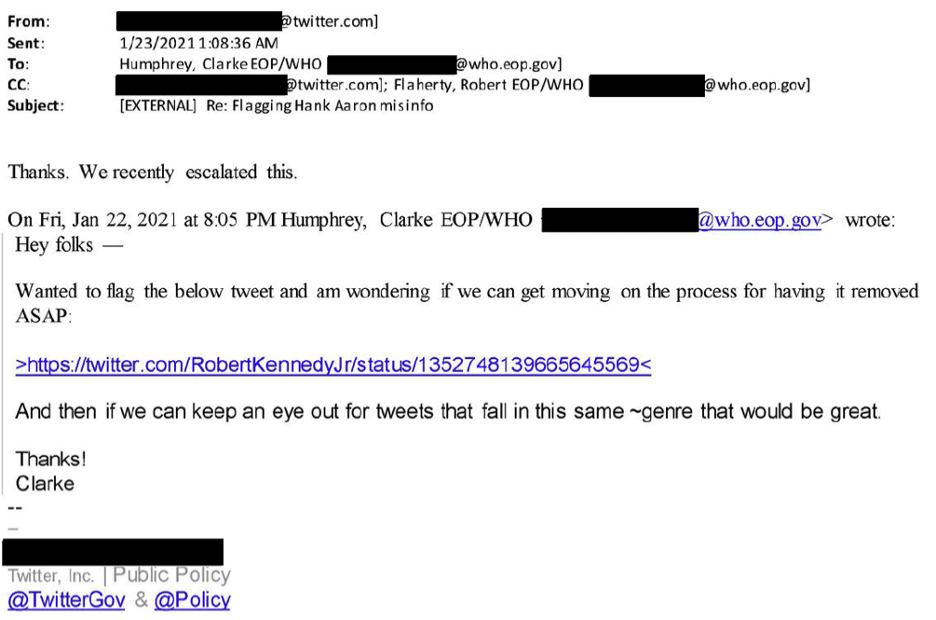Today’s 5 BULLETS Is Packed With Misinformation
![]() Don’t You Dare Call It a Recession!
Don’t You Dare Call It a Recession!
 For more than half of all Americans, it feels as if a recession is already underway.
For more than half of all Americans, it feels as if a recession is already underway.
A survey commissioned last month by the fintech company Affirm finds roughly three in five Americans believe the United States is currently in a recession.
The Guardian sponsored a separate survey in May finding that 56% of respondents believe the U.S. economy has fallen into recession.
 Of course, this being the 2020s, the corporate media has to get all scoldy about it…
Of course, this being the 2020s, the corporate media has to get all scoldy about it…


Even The Guardian felt compelled to add “wrongly” to the headline about its own survey.
Be careful if you say anything on social media asserting a recession is underway. The virtual hall monitors might slap a “misinformation” label on your post.
 You think I’m kidding, don’t you?
You think I’m kidding, don’t you?
Rewind to 2022 — when a guy on Instagram named Graham Allen performed a video stunt.
At the time, the Commerce Department had recorded two straight quarters of negative GDP — one of the informal definitions of a recession among economists.
The Biden administration was pushing back mightily against any recession talk — asserting that the nonprofit National Bureau of Economic Research had not yet declared a recession was underway.
So with camera rolling, Allen asked Apple’s Siri voice assistant to define the term “recession.” Siri obliged with the “two quarters of negative GDP” definition.
Instagram went and restricted access to the video on the grounds it contained “false information reviewed by independent fact-checkers.” Allen had to post the following to get out of the fact-checkers’ doghouse…

 With that, welcome to the 5 Bullets annual censorship issue.
With that, welcome to the 5 Bullets annual censorship issue.
We present it each year during the first full week of August — because it was this week in 2018 when professional loudmouth Alex Jones was simultaneously “deplatformed” by Facebook, YouTube, Apple and Spotify on the theory he was engaged in “hate speech.”
At the risk of appearing alarmist, I devoted an entire edition of this e-letter to the topic, titled, “After Alex Jones, Are We Next?”
As the independent journalist Michael Tracey observed in 2021, “If you were under any illusion back in 2018 that this would ever stop with Jones — a figure believed to be sufficiently repulsive that any punishment doled out to him would not have broader implications for the average internet user — well, it didn’t take long for proof of just how wrong you were.”
![]() A Short History of Online Censorship
A Short History of Online Censorship
 The first 18 months of the censorship campaign were mostly confined to instances of “hate speech” like Jones’ — speech that allegedly would inspire acts of violence against someone based on skin color, sexual orientation, etc.
The first 18 months of the censorship campaign were mostly confined to instances of “hate speech” like Jones’ — speech that allegedly would inspire acts of violence against someone based on skin color, sexual orientation, etc.
For anyone who raised an objection, the Establishment had a standard response: These are private companies. They have every right to determine who gets to play in their sandbox.
Bollocks. These private companies were acting under duress. Time after time, executives were raked over the proverbial coals at congressional hearings for their alleged failure to curb “hate speech” and “misinformation.”
In 2018, we cited Reason writer Zach Weissmueller: “Washington sees in Silicon Valley a chance to control speech in a way never before possible under the First Amendment, and to roll back the clock to a pre-internet age of media gatekeepers.
“The way to achieve this is by continually leveraging the threat of regulation.”
Worked flawlessly: Haul a tech exec before Congress, give him the third degree for a day, watch him fold like a lawn chair a few weeks or months later. Lather, rinse, repeat.
 And then came COVID.
And then came COVID.
Weeks before lockdown came to America in March of 2020, “misinformation” about the virus was already cause for suspension on Twitter.
By the summer of 2021, the White House freely acknowledged it was “flagging problematic posts for Facebook that spread disinformation” about the virus and the jabs.
At least up to that point, the censors could justify all the suspensions and cancellations on the grounds of preventing harm against others (in the case of “hate speech”) or harm against oneself (with allegedly bogus COVID treatments).
 But by 2022, all pretense had been dropped: Social-media censorship is simply about the enforcement of mainstream orthodoxy.
But by 2022, all pretense had been dropped: Social-media censorship is simply about the enforcement of mainstream orthodoxy.
Critics of U.S. aid to Ukraine found themselves vulnerable to suspension or cancellation. YouTube demonetized the channel of a Los Angeles-based Twitch streamer, Jackson Hinkle.
And as you saw above, even an opinion about the state of the economy was subject to the censors’ scrutiny.
By last year, when Silicon Valley Bank was going under, Sen. Mark Kelly (D-Arizona) was asking the Federal Reserve, Treasury Department and FDIC how they could exercise social-media censorship to prevent a run on the banks.
The power elite’s endgame is obvious, and it harks back to Weissmueller’s remark above about “a pre-internet age of media gatekeepers.”
The goal is a 21st-century version of the “good old days” when three national evening newscasts, taking their cue from that morning’s New York Times, set the boundaries for acceptable discourse.
Slender boundaries they are, akin to the 40-yard lines on a football field. Anything to the left of Hillary Clinton or the right of Mitt Romney is at risk of the ban hammer.
Given how so much of the censorship touches on economic and financial matters… and how our business relies on the right to free expression… you can understand our concern.
![]() Newsletters in the Crosshairs
Newsletters in the Crosshairs
 From the earliest days of our trade, financial newsletter editors have trafficked in ideas outside the mainstream.
From the earliest days of our trade, financial newsletter editors have trafficked in ideas outside the mainstream.
Nearly a century ago, Roger Babson warned the Roaring ‘20s were destined to end in tears. (They did.) A half-century ago, Harry Browne urged readers to forget the “Nifty Fifty” stocks and pile into precious metals after President Nixon killed off the last vestiges of the gold standard. (Good advice then.) Just over a quarter-century ago, James Dale Davidson warned about The Plague of the Black Debt. (It still plagues us.)
Across the decades, up to the present day, newsletter editors give voice to a nagging feeling people have in the back of their minds — that reality isn’t the way the mainstream gatekeepers portray it. We daresay financial newsletters were the pioneers of “alternative media.”
Here in these 5 Bullets and in our predecessor e-letter, we’ve brought our own snarky spin to the newsletter art — lobbing spitballs at central bankers, politicians and the allegedly best-and-brightest denizens of Wall Street.
We called out former Federal Reserve Chairman Ben Bernanke for perjury. We called out Warren Buffett for outrageous acts of crony capitalism. We called out House Speaker Paul Ryan as a phony years before it was fashionable. We called out JPMorgan Chase CEO Jamie Dimon for all-around douchebaggery.
 For the longest time, we did this while flying under the radar. The newsletter biz was a niche thing with a limited audience.
For the longest time, we did this while flying under the radar. The newsletter biz was a niche thing with a limited audience.
But by 2016 and 2017, two of our editors showed up on blacklists smearing them as Russian stooges — blacklists amplified by “prestigious” think tanks and media organs like The Washington Post.
It was astonishing. Criticize the Federal Reserve or the big banks and you could be accused of “amplifying Russian talking points” and “sowing discord” among everyday Americans.
What I didn’t realize at the time was that these were the early acts of an emerging “censorship industrial complex” — encompassing government agencies, Big Tech, academia and mushrooming nonprofits devoted to rooting out “disinformation.”
![]() The Censorship Industrial Complex
The Censorship Industrial Complex
 Starting in late 2022, the stupefying extent of the censorship came out into the open — laying bare how the censorship industrial complex works.
Starting in late 2022, the stupefying extent of the censorship came out into the open — laying bare how the censorship industrial complex works.
First came the “Twitter Files” — revealing internal communications at Twitter during the years before Elon Musk bought the company. Musk and his team shared the memos, emails and chats with a half-dozen writers led by ex-Rolling Stone reporter Matt Taibbi. (Another, Michael Shellenberger, is the one who coined the term “censorship industrial complex.”)
The Twitter Files demonstrated a clear pattern of harassment and intimidation on the part of three-letter agencies — browbeating Twitter’s pre-Musk leadership to suppress speech that flew in the face of government-approved narratives.
For instance: “Hi team, can we get your opinion on this? This was flagged by DHS.” Or “Please see attached report from the FBI for potential misinformation.”
In short order, these “flags” and “reports” would lead to the suspension of people’s accounts.
True, Twitter’s “woke” managers were frequently eager to cooperate — but many of the Twitter Files also show them frustrated with the feds’ demands they uncover evidence of, say, “a Russian op” when none existed.
 In addition to the Twitter Files, still more damning documents emerged in the federal court case Murthy v Missouri.
In addition to the Twitter Files, still more damning documents emerged in the federal court case Murthy v Missouri.
The case was brought by the attorneys general of Missouri and Louisiana — joined by epidemiologists Jay Bhattacharya and Martin Kulldorff. Perhaps you recognize their names as co-authors of the Great Barrington Declaration of October 2020 — a statement challenging the politicized “science” behind COVID lockdowns, restrictions and mandates. Both were subject to social-media bans.
Likewise for another plaintiff, psychiatrist Aaron Kheriaty — author of The New Abnormal: The Rise of the Biomedical Security State.
As Kheriaty wrote last year, “Documents we have reviewed on discovery demonstrate that government censorship was far more wide-ranging than previously known, from election integrity and the Hunter Biden laptop story to gender ideology, abortion, monetary policy, the U.S. banking system, the war in Ukraine, the U.S. withdrawal from Afghanistan and more. [Emphasis ours.]
“There is hardly a topic of recent public discussion and debate that the U.S. government has not targeted for censorship.”
And the censorship is as blatant as it gets. You can click on the following tweet for compelling documentary evidence…

Elsewhere in the Murthy v. Missouri documents, we learn that during the first week of the Biden administration, the White House sent a “request” for Twitter to delete a tweet by Robert F. Kennedy Jr.

![]() Beyond Censorship, There’s “Financial Cancellation”
Beyond Censorship, There’s “Financial Cancellation”
 Alas, six weeks ago the Supreme Court gave a free pass to the censorship industrial complex in a 6-3 decision (with two of the three Trump appointees joining the majority).
Alas, six weeks ago the Supreme Court gave a free pass to the censorship industrial complex in a 6-3 decision (with two of the three Trump appointees joining the majority).
I expended all 5 of our Bullets in the June 27 edition laying out why the decision was so awful, so I won’t rehash it here.
Suffice to say that the majority seemed A-OK with the proposition that government agencies should be the arbiters of truth — even when the “truths” they proclaim turn out to be wrong.
➢ The ultimate example in this regard is Joe Biden at a CNN town hall in July 2021: “You’re not going to get COVID if you have these vaccinations.” (Biden subsequently tested positive three times in two years.)
As Matt Taibbi wrote last year, “The authors of the Constitution understood that giving anyone the authority to decide questions of fact would create incentives for censorship, especially since government offices tend to be occupied by people with strong political beliefs.”
And as Current Affairs editor Nathan Robinson tweeted, “Restrictions on ‘misinformation’ are bad because they inevitably empower a fallible authority who cannot be trusted to distinguish truth from falsehood. Restricting it doesn’t cause lies to vanish, it just gives one person or entity a power that nobody should have.”
Finally, Libertarian Institute executive editor Sheldon Richman: “Let’s remember that much of the challenge to the government’s take on the pandemic and other matters — criticism belittled as ‘tin-foil’ conspiracy-mongering — turned out to be true.
“Contrary to the government’s position, the search for the truth requires the freedom to openly disagree and debate. That search abhors centralization, coercion and the exclusion of anyone but the politically anointed ‘experts.’”
 Worse, behind the censorship is the ever-looming threat of “financial cancellation.”
Worse, behind the censorship is the ever-looming threat of “financial cancellation.”
As Taibbi testified to Congress last year, “Ordinary Americans are not just being reported to Twitter for ‘de-amplification’ or de-platforming, but to firms like PayPal, digital advertisers like Xandr and crowdfunding sites like GoFundMe. These companies can and do refuse service to law-abiding people and businesses whose only crime is falling afoul of a distant, faceless, unaccountable, algorithmic judge.”
One of PayPal’s founding executives, David Sacks, saw the slippery slope in 2021: “As with the censorship of speech, financial deplatforming often begins as something that seems narrow and reasonable — who wouldn’t want to ban the Oath Keepers or Proud Boys? But once the power is granted, it metastasizes into widespread use.”
Yep. In 2022, PayPal and Venmo canceled the accounts of the aforementioned Jackson Hinkle, the Twitch streamer who refused to toe the Washington line on the Ukraine war. PayPal delivered the same treatment to the venerable alt-news website Consortium News, evidently for the same reason.
Of course, the ultimate example of financial cancellation was the Canadian truckers in February 2022 — locked out of their bank accounts for protesting vaccine mandates.
Last year, the closing of British pundit Nigel Farage’s bank accounts backfired badly — but stateside, JPMorgan Chase canceled several accounts linked to Dr. Joseph Mercola, the alternative health guru.
So it’s not just a free-speech issue. It’s right in our wheelhouse of money and markets.
Today we redouble our commitment to stay on top of it and keep you in the loop. Because it’s not as if the Supreme Court is going to lift a finger to stop any of it…
P.S. After an attempted rally fizzled yesterday, the U.S. stock market is rebounding strongly today — the S&P 500 up 84 points or 1.6% as we write at 5,284. (Still almost 400 points to go to reclaim the record levels of July 16.)
The one significant economic number today had the potential to throw Mr. Market for a loop — but first-time unemployment claims eased off from 250,000 last week to 233,000 this week.
Precious metals are also staging a solid rally, gold up $35 to $2,416 and silver up 85 cents to $27.43. Crypto is getting a lift too, Bitcoin flirting with $60,000 again.
Crude has pushed past $76 as a survey conducted by the Chicago Council on Global Affairs finds 56% of Americans opposing the use of U.S. troops to defend Israel if Israel comes under attack by Iran.
As always, thanks for indulging us in one of our occasional single-topic deep dives. Back to regularly scheduled programming tomorrow.










